Exploring Fallout Playing Cards: Design and Significance
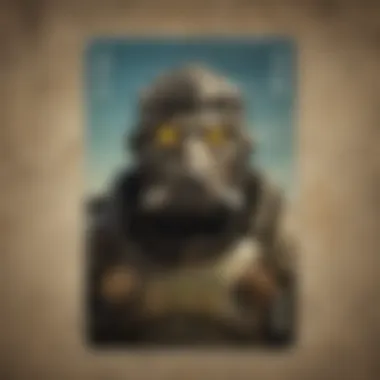
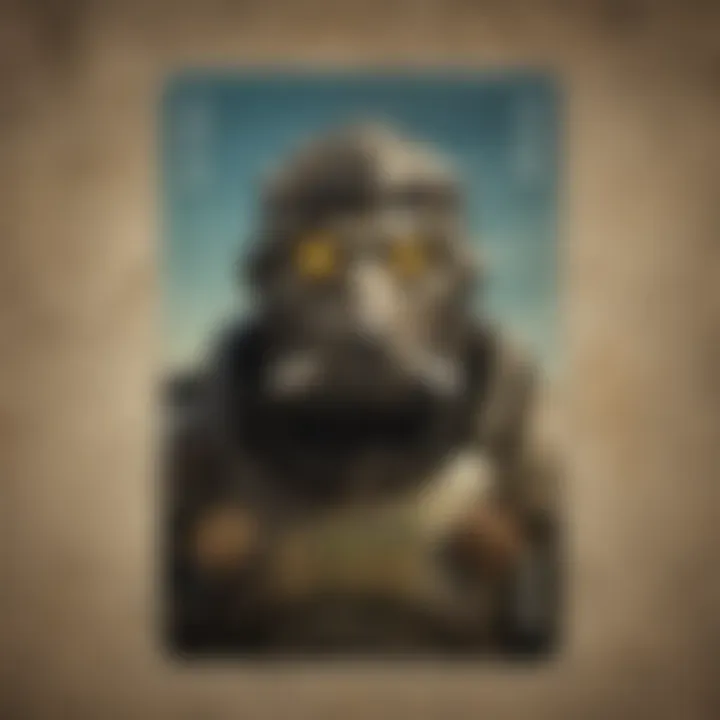
Intro
In the expansive world of Fallout, what appears to be a simple deck of cards morphs into an intricate tapestry of lore, design, and community engagement. While the games are primarily known for their open-world mechanics and post-apocalyptic narratives, the inclusion of playing cards reveals a quieter yet equally fascinating facet of the series. These cards not only serve as collectibles but also as vessels that encapsulate the essence of the Fallout universe, intertwining history with gameplay and player interaction.
As we journey through this article, we will explore how these playing cards elevate storytelling, deepen thematic engagement, and spark a vibrant community culture. We’ll touch on everything from their historical significance to the nuances of their design, ensuring that both die-hard fans and newcomers can walk away with a clearer picture of their importance. Prepare for a comprehensive guide that delves into the depths of Fallout’s playing cards, unearthing the hidden treasures that lie within them.
Lore Insights
Overview of the Fallout Universe
The Fallout universe is a post-apocalyptic setting that emerges from a divergence in historical events and cultural evolutions stemming from the 1950s. Society, having become enamored with nuclear technology, finds itself facing dire repercussions as the world unravels into chaos. With themes of survival, revenge, and rebuilding, the franchise has cemented itself as a touchstone for gamers seeking a mix of bleakness and dark humor.
Each game in the series touches upon various fateful moments within this dystopia, showcasing how humanity has adapted, survived, or failed amidst the fallout—literally and metaphorically.
Key Historical Events in the Fallout Timeline
Several pivotal moments shape the context into which players dive:
- The Great War (2077): A global nuclear conflict that heralds the collapse of civilization, setting the stage for the Fallout series.
- The rise of the Brotherhood of Steel: A response to the disarray, this faction emerges with a focus on technology and preservation of knowledge.
- The Enclave's return: Representing remnants of the pre-war government, the Enclave adds layers of political intrigue.
These events not only form the backbone of the narrative but also cast shadows on many of the items and symbols found within the series—including the playing cards.
Deep Dive into the Backstory of Major Factions and Characters
Factions in Fallout encapsulate various ideologies and struggles, and their stories manifest in the design of the games' collateral, including the playing cards. Each card can tell a story—depicting the iconic Vault Boy in various scenarios or aligning with the Brotherhood's independent yet united moral compass.
Moreover, major characters, like Vault Boy, serve as symbols of enduring hope and absurdity, compelling players to engage with the lore beyond just gameplay mechanics. These characters are not just side notes; they encapsulate the complexities of human traits surviving amidst the ruins.
Community Engagement
The Fallout playing cards have fostered community engagement unlike many collectibles in gaming lore. Players and fans have created elaborate artwork inspired by these cards, forming an artistic dialogue about what the Fallout universe means to them.
Each card embodies elements related to gameplay, prompting discussions and theories about their significance. Numerous Reddit threads erupt with players discussing personal interpretations and theories surrounding these cards, merging the worlds of gameplay, artistry, and community networking.
"In the world of Fallout, every card played narrates a rich story; it invites players to not just play, but to immerse themselves in a culture of rebirth and resilience across a shattered world."
As we move forward, we shall delve deeper into the gameplay elements of these fascinating collectibles and examine how they enhance player experiences.
Intro to Fallout Playing Cards
The realm of Fallout is a complex tapestry woven with narratives, conflicts, and a distinct post-apocalyptic aesthetic. Within this universe, playing cards emerge as more than mere props; they serve to enrich the overall gaming experience and deepen players' immersion in the story. Understanding Fallout playing cards helps us appreciate their role not just in gameplay, but also in shaping the cultural fabric of the series.
The importance of this exploration lies in recognizing the multifaceted elements these cards introduce. From providing strategic gameplay advantages to reflecting the darker themes of survival and morality, each card tells a story of its own. This article dives into the intricate dynamics at play, offering insights into how.cards influence decision-making and strategy.
Furthermore, Fallout playing cards represent a community culture, where fans collect, trade, and even create their own versions. These interactions highlight the passion surrounding the series and the cards beyond their initial purpose.
Overview of Fallout Universe
In the Fallout Universe, set in a post-nuclear wasteland, the world is anything but ordinary. It showcases a meticulous reconstruction of a 1950s America stirred with retrofuturistic elements. The inhabitants grapple with the aftermath of catastrophic war, battling mutated creatures and navigating through societal collapse. This context is important as it frames the very essence of Fallout playing cards. The cards often draw on themes from the environment, characters, and lore, integrating seamlessly into the existing narrative.
The Fallout games have depicted various factions, from the Brotherhood of Steel to raiders and super mutants, each representing unique philosophies and conflicts. Understanding these dynamics enriches our perception of the cards their symbolism often intertwines with the different factions.
The Role of Cards in Gaming
Cards have long held a prominent place in gaming, serving a variety of functions that enhance the overall gameplay. In the context of Fallout, they are not merely tools for chance but strategic instruments that require careful consideration and thought.
- Strategy and Decision-Making: Players often find that their choices in card play can have direct consequences in-game actions, leading to victory or failure.
- Engagement: A deck of cards can immerse players more deeply as they choose tactics that align with their gameplay style.
- Community and Creativity: Cards facilitate multiplayer interactions, allowing players to engage with one another in shared narratives and collaborative strategies.
The integration of cards into gameplay mechanics transcends traditional play styles, encouraging players to think outside the box and adapt to various scenario challenges.
In essence, Fallout playing cards occupy a unique space in gaming where narrative depth meets strategic gameplay. Their significance in the overall experience cannot be understated, making them a vital component worth exploring.
Historical Context of Playing Cards in Fallout
The historical background of playing cards in the Fallout universe provides a rich tapestry that enhances understanding of the game’s world and its cultural influences. To grasp the significance of these cards, one must explore the early instances where cards first appeared in gaming, before examining how they evolved progressively through various iterations of the Fallout series.
Early Instances of Cards in Gaming
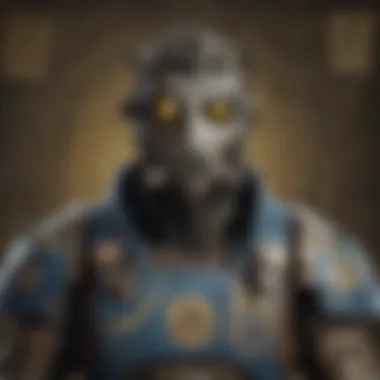
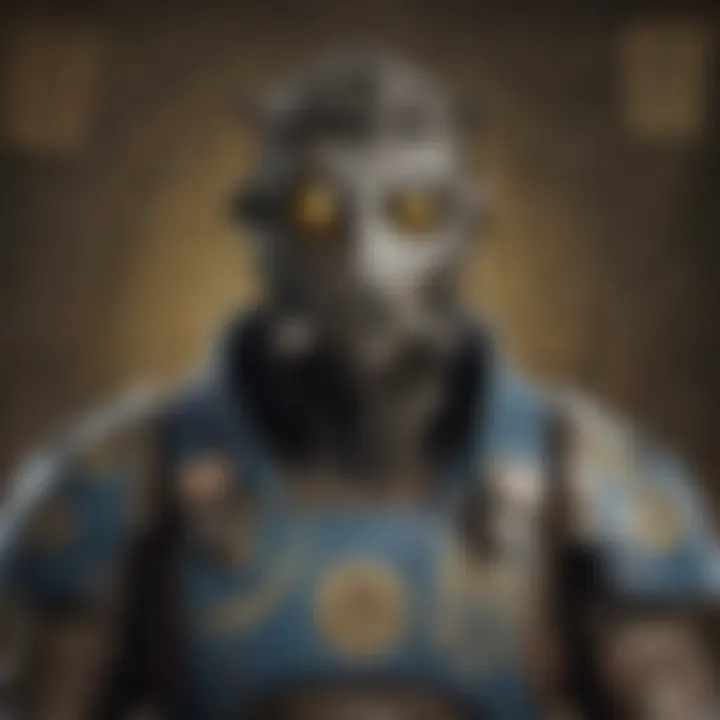
Playing cards have long held a special place in gaming across many cultures. In the context of video games, the incorporation of card mechanics can be traced back to classic titles where cards were often utilized to manifest strategy and chance. Some may recall games like Magic: The Gathering, which effectively utilized cards as a central gameplay element. Such games demonstrated how cards could enhance interaction, strategy, and even suspense among players, setting the groundwork for future applications.
In early RPGs (role-playing games), basic playing cards allowed players to engage with strategy beyond combat, embedding them deeper into the gaming narrative. The concept of a card system was novel but immediately captivating to gamers. Cards transformed simple attributes and mana into something more concrete, thus amplifying decision-making processes.
From the get-go, using cards in gaming provided a way for players to build a personalized journey, often leading to a more immersive experience. As the industry matured, designers began to understand that integrating cards brought an added layer of depth to narratives, prominently paving the way for a community already eager for more interactivity in their virtual escapades. The seeds were sown, albeit indirectly, for how playing cards would later flourish in the Fallout series.
Evolution through the Fallout Series
As the Fallout series developed, the role of playing cards evolved into an iconic symbol, melding seamlessly with the dystopian flair that defines the franchise. Each game iteration offered fans a fresh take on card mechanics, occasionally breaking the mold yet always staying true to the thematic essence of survival and moral choices.
In Fallout: New Vegas, for instance, the cards adopted the imagery of the S.P.E.C.I.A.L system. This fusion furnished characters with unique characteristics, guiding gameplay and forming a bridge between chance and strategy — a hallmark of Fallout's design philosophy. Players could use cards to enhance or manipulate decisions, directly affecting their in-game fate.
The transition didn’t stop there. A notable example from Fallout 76 introduced collectible cards, known as
- Perk cards, which players could utilize to tailor their characters proactively.
- These cards enable customization on various paths, shilevering fresh possibilities for engaging with the game mechanics.
Moreover, this shift not only established the cards as a tactical element but also fostered a sense of community, as players shared decks, strategies, and builds in forums like Reddit, further breathing life into the gameplay experience.
Among die-hard enthusiasts, collecting these cards has morphed into a delightful side-quest. The thrill of discovering rare cards often rivals that of gameplay itself.
Design and Aesthetics of Fallout Playing Cards
When it comes to the enchanting world of Fallout, the creativity and artistry found within the playing cards can’t be simply brushed aside. Each card acts not just as a gameplay mechanic, but as a piece of art in its own right. The design and aesthetics of these cards contribute significantly to the immersive experience that Fallout offers, intertwining with its narrative and enhancing the atmosphere of exploration and survival.
The visual appeal of the Fallout playing cards also serves a practical purpose. Incorporating vivid imagery and stylistic elements complements the game’s aesthetic, helping players establish a connection to the aftermath of the nuclear apocalypse they navigate through while they strategize. Beyond just being nice to look at, these cards frequently reflect the gritty and vibrant undertones of the Fallout universe, reminding experienced players and newcomers alike why they fell in love with the franchise in the first place.
Artistic Influence and Style
The artistry of Fallout playing cards draws heavily from various influences that span both post-apocalyptic themes and retro-futuristic designs. Artists delve into the deep well of inspiration provided by the game itself, producing illustrations that resonate with the tongue-in-cheek humor characteristic of the series. Players may notice vintage comic styles and pop art sensibilities that evoke a sense of nostalgia while presenting modern narratives.
Design elements should not be overlooked either. The illustrations on the cards incorporate strong lines, bold colors, and distinct characters. It's a veritable feast for the eyes, offering things like the perpetually cheerful mascot, Vault Boy, doing everything from playing poker to engaging in sneakier dealings. The artistic style ensures these cards are much more than simple playing pieces; they serve as a window into the chaotic beauty of the Fallout world.
- Contrast between light-hearted imagery and darker themes
- Use of color to evoke emotion and context
- Symbolism woven into character representations
Consequently, playing with these cards is akin to stepping into a vibrant tableau, where every hand dealt becomes a new adventure framed by the unique style that defines the Fallout series.
Symbolism Behind Artwork
Digging deeper into the symbolism embedded in Fallout playing cards reveals layers of meaning that resonate with players’ experiences. Each card often encapsulates themes of survival, morality, and the oftentimes absurd consequences of choices made in desperate situations.
Players coming across images of characters holding cards while gazing into the distance might find themselves pondering the weight of decisions laid out before them, both in-game and in real life. For instance, a card depicting a character taking a gamble might represent risk-taking, a fundamental aspect of the gameplay, echoing the necessity of embracing uncertainty in a world ravaged by catastrophe.
Additionally, the choice of imagery can resonate with fans on a nostalgic level. The representation of different factions within the game, represented by unique symbols on the cards, serves as a reminder of alliances and conflicts essential to the narrative. Essentially, artwork on each card becomes more than decoration – it acts as a symbolic guidepost within the grander storytelling of Fallout.
"The cards in Fallout mainline the themes we experience in the game; every choice holds weight, and the art often hammers that point home."
In summary, the design and aesthetic choices made in crafting Fallout playing cards not only enhance gameplay but also create a visual narrative that resonates deeply with the player’s journey. Each card is not merely a tool or mechanism; they serve as vital storytellers in the intricate world of Fallout.
Gameplay Mechanics Involving Playing Cards
Understanding the gameplay mechanics involving playing cards in the Fallout series is essential for players who want to fully leverage their strategy and enjoy the game to its fullest. These cards are more than just decorative items; they interact with the gaming environment in complex ways that affect player choice and narrative outcomes. In this section, we will look into how cards are incorporated into game strategy, as well as their impact on player decisions.
Integrating Cards into Game Strategy
Using playing cards as part of game strategy can elevate a player’s experience significantly. The Fallout series includes various systems where cards represent abilities, resources, or strategic advantages. Combining these elements can lead to a diverse array of tactical options. This could involve choosing when to play a specific card that boosts one’s attack during a critical fight versus saving it for a more strategic moment in a negotiation or trade.
Some noteworthy aspects to consider:
- Resource Management: Players must decide when to invest their cards thoughtfully, akin to managing resources in other strategic games.
- Synergy Between Cards: Different cards can interact with one another. For instance, a character may have a playing card that enhances their luck, which can affect their chances of drawing a more powerful card.
- Timing and Context: Knowing when and how to utilize these cards requires a blend of foresight and adaptability. Contextual decisions can lead to either great triumph or dire failure.
By mastering the integration of cards into their strategy, players can open new avenues in gameplay, pushing them to think critically and adaptively.
Influence on Player Decisions
The mechanics associated with Fallout playing cards also significantly influence player decisions. Every interaction with the card mechanics demands a choice, whether it’s deciding between two cards or weighing the potential outcomes of playing a specific card at a crucial junction in the game.
Here are important points regarding their influence:
- Moral Ambiguity: Many cards present morally ambiguous decisions that resonate with the overarching themes of the Fallout universe. These choices can impact not only immediate gameplay but also long-term narrative arcs.
- Strategic Outcomes: Decisions related to card play can create a ripple effect, affecting future battles, alliances, and developments in the narrative. The intertwining of card choices with player actions leads to rich storytelling opportunities.
- Psychological Element: Players often feel a connection to their cards, treating them as more than just game pieces. This adds a layer of emotional investment, which in turn influences their decisions. Choosing a card can feel like taking a stand, reinforcing the player’s agency within the game.
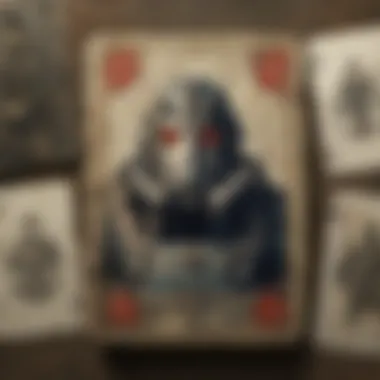
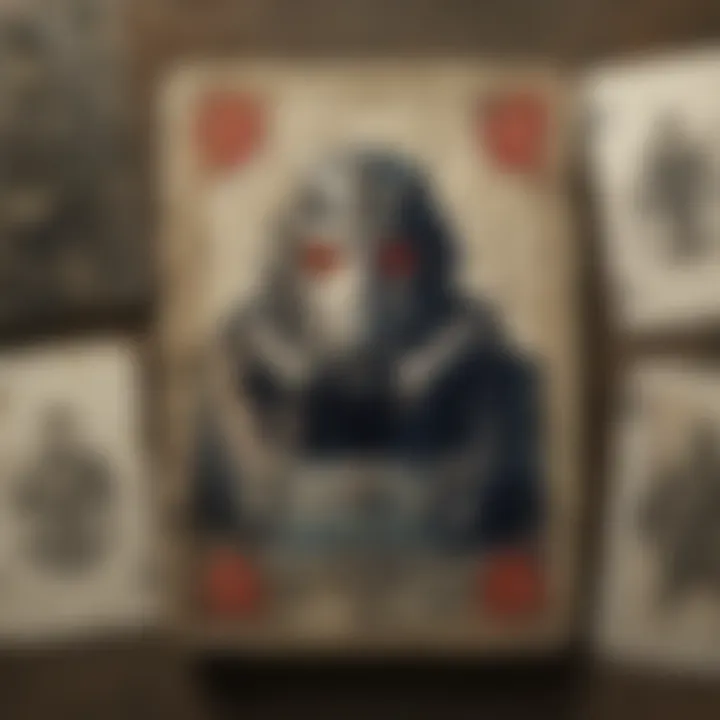
"In the universe of Fallout, where survival is the game and strategy the key, playing cards transform ordinary decisions into life-or-death scenarios."
In summary, the mechanics surrounding playing cards in Fallout are crucial for players who seek to enhance their gameplay experience. By integrating these cards smartly into their strategies and appreciating the depth of decision-making involved, players can find themselves deeply immersed in the Fallout world, with every choice feeling significant and impactful.
Community Engagement with Fallout Playing Cards
Community engagement around Fallout playing cards reflects a vibrant ecosystem where fans not only interact with the game but also express their creativity, passion, and dedication to the Fallout universe. The significance of this engagement goes beyond mere collection; it fosters a sense of belonging among players and allows for the organic growth of game-related activities, exchanges, and innovations.
Fan Collections and Custom Creations
Individuals often treat their collections as prized possessions, with some even going as far as to create personalized versions of their favorite sets. For example, imagine a creative mind transforming standard playing cards into unique pieces of art, perhaps by incorporating in-game elements like the Vault Boy or iconic weapons into custom designs. This creativity serves multiple purposes: it celebrates the fandom, feeds into the artistry of the gaming culture, and provides a channel for players to express their personal journeys through the Fallout universe.
Additionally, collectors frequently showcase these finds through social media platforms or gatherings, creating a community where passion is shared and nurtured.
- Platforms like Facebook or Reddit become hubs for fans to trade cards, share photos of their collections, and even discuss strategies based on the cards they love.
- Local shops or gaming stores might host events and showcases where collectors can meet, trade, and discuss the various designs and strategies.
Fans can also design their own limited editions, giving a nod to particular storylines or nostalgic elements from the Fallout series. The intersection of fan creativity and strategic gameplay brings about a new landscape for card enthusiasts.
Going Beyond the Game: Tournaments and Events
Tournaments centered around Fallout playing cards offer fans a thrilling way to interact more deeply with the game and each other. These events range from formal competitions, with prizes often tied to in-game content, to casual meet-ups held in local game stores. Through tournaments, players not only demonstrate their skills but also gain invaluable experience and camaraderie with fellow enthusiasts.
- Competitions often showcase innovative rule sets or unique formats that aren’t found in the game itself, effectively enhancing strategic thinking and player interaction.
- Some fans even take it up a notch by hosting themed events or dress-ups that immerse all participants in the Fallout universe.
The excitement isn't limited to competition; it includes social aspects such as networking and collaboration. These gatherings can lead to new friendships that extend beyond the card games. Each tournament presents a chance for connections, strategy exchanges, and perhaps even collaborative projects where ideas for more expansions or custom cards emerge.
"Engaging in a community event can spark new ways to enjoy the game, while also blending competitive spirit with friendship."
Thematic Connections to the Fallout Narrative
In the turbulent landscapes painted by the Fallout universe, playing cards go beyond mere tools for entertainment; they are deeply intertwined with the game’s core themes. Their presence serves as a mirror reflecting the complexities of survival and the strategies players must deploy to navigate the challenges of a post-apocalyptic world. This section digs into how these elements resonate through the card mechanics and their thematic implications, enriching the overall player experience.
Themes of Survival and Strategy
Survival is a recurring motif throughout the Fallout series. In a world where resources are scarce and threats abound, players are constantly reminded that every decision could be a matter of life and death. Playing cards poke at this theme, presenting strategic choices that echo the dilemmas faced during gameplay.
When dealing a hand, players must evaluate their options through the lens of resource management. Each card can represent not just a game move but a strategic calculation of potential risks and rewards. For instance, in games like Fallout: New Vegas, certain cards might symbolize factions or unique abilities, allowing players to delve into deeper tactical decisions. Choosing whether to play a card to attack or to defend against an opponent's actions can resemble choices made in the wasteland—whether to engage in conflict or find a way to negotiate peace.
"Cards are like people in the wasteland; you’ve got to know when to fold and when to go all in."
This analogy holds true as the stakes rise. The player’s ability to read the room is essential; just as one wouldn’t blindly charge into a raider camp, so too must they consider the playing field during a match. The anticipation of an opponent's move makes each round of gameplay not just a shuffle and deal, but a test of wits worthy of the harsh realities enveloping the Fallout universe.
Moral Choices Reflected in Card Play
Another critical layer within Fallout’s gameplay is the moral ambiguity it often presents. The choices players face can be as daunting as those determined by the turn of a card. Within this framework, the playing cards symbolize moral decisions and the ethical ramifications that arise from them.
For example, certain cards might offer unique boosts or abilities that come at a moral cost. Using a card that provides a significant advantage to your position could also trigger unintended consequences for character relationships or story arcs within the game. This reflects the core principle of the Fallout narrative, where actions rarely come without repercussions.
Through the lens of these cards, players engage in a form of narrative exploration that aligns with the moral challenges of the Fallout series. As characters grapple with their choices, so too do players must confront the implications of their strategies in relation to others.
It’s in these moments that the cards become more than just numbers and suits; they transform into the ethical gambits that challenge us to think critically about our actions within this dystopian setting.
Thus, the themes of survival, strategy, and morality interweave through every shuffle, creating a rich tapestry that deepens the player experience in Fallout’s card-based gameplay.
Whether it’s assessing risk during a tense moment or reflecting on a choice made after the fact, players continuously engage with these elements, allowing for a profound interaction with not just the game, but with its layered narrative as well.
Comparative Analysis with Other Card Games
The comparative analysis of Fallout playing cards with other card games serves as a vital piece in understanding their niche within the broader gaming landscape. While card games have existed for centuries, each possesses unique mechanical features, themes, and player engagement styles. This analysis brings to light not only the distinctive elements of Fallout cards but also the ways in which they interact with familiar card gaming traditions.
Contrasting Gameplay Styles
When placed next to traditional games like poker or collectible card games such as Magic: The Gathering, Fallout playing cards reveal a gameplay style that is influenced by the larger mechanics of the video game series itself. In classic poker, the focus is on betting strategy and psychological gameplay. While there is an element of bluffing in some Fallout card game adaptations, the emphasis shifts towards decision-making that impacts long-term survival within the game world.
Players often find themselves choosing cards that reflect strategic advantages, mirroring how they must make choices in the wasteland. By understanding these contrasting styles, it becomes easier to appreciate how Fallout cards function as a narrative tool, integrating themes of survival and morality into gameplay.
Unique Features of Fallout Card Systems
What sets Fallout playing cards apart from their contemporaries is not just the aesthetic, but also their unique features integrated into the gaming experience. Fallout cards often include character abilities, quests, and effects that directly relate to the game’s lore. This fosters an environment where every turn can feel like a piece of the larger narrative, rather than just a simple card play.
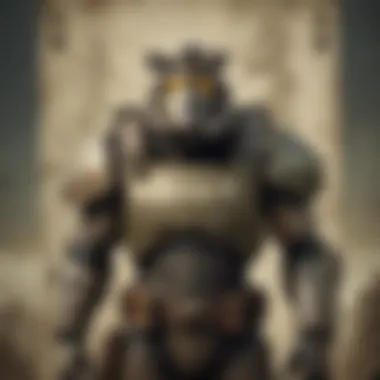

- Character-Specific Abilities: Many cards reflect the traits or quirks of characters in the Fallout universe, offering players a chance to utilize familiar faces like Vault Boy in creative ways.
- Dynamic Effects: Certain cards may alter gameplay drastically, allowing players to respond to in-game events or changes in player strategies, creating a more fluid experience than standard card games.
- Thematic Integration: Unlike some card games which may feel isolated from their source material, Fallout's cards are steeped in the series’ post-apocalyptic themes and quirky humor.
In essence, comparing Fallout playing cards to other card games highlights their unique appeal and gives players a richer gaming experience that stands out in an increasingly crowded market.
"Fallout playing cards aren't just for games; they interweave the essence of survival and strategic depth, making each deck a portal into the wasteland's turbulent world."
The analysis of these elements reveals that while there are countless card games, the distinctive nature of Fallout playing cards truly enhances the narrative and strategic depth of the gaming experience. Both seasoned fans and newcomers can gain valuable insights from this exploration, enriching their overall engagement with the Fallout universe.
Collectibility and Market Trends
The fascination with collectible items has always been a defining element of fandom culture, and Fallout playing cards are no exception. They resonate deeply within the community for their historical value and strategic role in the gaming experience. The collectibility of these cards is enormous, as they tie in memorabilia, nostalgia, and in-game significance, all of which propel their desirability among players and collectors alike. The unique artwork, character references, and limited editions can boost their value on the open market, making them coveted items.
Value of Vintage Fallout Cards
Vintage Fallout cards can fetch a pretty penny, especially those that hail from the earlier titles in the series. Their worth doesn't just come from age but also from their rarity and connection to significant game moments. For collectors, owning a piece of that history is akin to holding a fragment of the game’s legacy.
When assessing the value of these cards, a few considerations come into play:
- Condition: Cards in pristine condition naturally command higher prices. Collectors often seek cards that are unblemished without creases or faded ink.
- Edition Type: Limited runs or cards from special editions usually carry more weight. Fans of the series are willing to spend more on artifacts that are tied to unique game expansions or events.
- Desirability: Cards featuring prominently loved characters or iconic gameplay moments are often at the forefront, driving prices up significantly.
The excitement that comes with finding a valued card mirrors the thrill of finding loot within the game itself, making every trade or purchase a piece of that adventure.
Marketplaces for Trading and Selling
The market for Fallout playing cards isn’t limited to physical stores but is also a vibrant ecosystem online. Platforms like Reddit, Facebook groups, and specialized collectible sites foster thriving communities dedicated to buying, selling, or trading these cards. Some notable facets of these marketplaces include:
- Forums and Online Communities: Platforms such as Reddit feature engaged user bases where collectors discuss market trends, price checks, and offer cards for trade. These discussions enhance the value of shared knowledge, benefitting all parties involved.
- Auction Sites: Websites where bidders can get competitive offers for rare cards. Auctions often see prices skyrocket, especially for cards in excellent condition or standing out in a particular series.
- Dedicated Collectible Platforms: Sites like eBay or specialized card trading platforms offer a wider reach. Here, sellers can list cards with the hope of catching the eye of serious buyers, while buyers can compare offers before making decisions.
"The thrill of trading cards often mirrors the intensity of gameplay itself—each transaction holds the potential for a thrilling win."
For many, the monetary value tied to these cards serves to enrich their gaming experience, making every purchase a strategic decision worth considering. Collecting Fallout playing cards becomes not just an act of ownership, but also an investment in a shared gaming culture.
Future Prospects for Fallout Playing Cards
The future of Fallout playing cards holds intriguing potential for both the game and its community. As the franchise evolves, so too does the possibility for card-related expansions and innovations that could deepen player engagement. This section explores the multifaceted prospects for these cards, emphasizing their importance within the narrative framework and gameplay experience of Fallout.
Potential Expansions and Updates
As seen in recent trends, developers have shown a keen interest in enriching the player experience through expansions.
- New Characters: Integrating fresh characters from the Fallout universe into the card game could add layers of strategy. Imagine cards featuring notable figures like Nick Valentine or even new additions from the latest games.
- Thematic Sets: Creating expansions that align with specific Fallout themes, like survival or post-apocalyptic challenges, could diversify gameplay. Each set might introduce unique mechanics that reflect the essence of a particular storyline or game installment.
- Digital Versions: With the rise of online gaming, digital adaptations could allow for even more complex interactions. Players could compete against others globally, potentially fostering a competitive scene similar to what trading card games have.
These planned expansions must not just add content but also enrich the narrative. Players value character depth and story immersion, which can turn simple card gameplay into a powerful storytelling tool.
Evolving Community Contributions
The community surrounding Fallout playing cards is vibrant and continuously evolving. This grassroots involvement plays a pivotal role in shaping the future of these cards by influencing developers and augmenting the overall gameplay experience.
- Fan-Made Designs: Players are stepping up to create their own card designs, often leading to intriguingly fresh interpretations of characters or concepts. This isn’t merely about aesthetics; these custom cards might add unique gameplay mechanics, appealing to both casual players and hardcore enthusiasts.
- Collaborative Events: The community often organizes tournaments, where players not only showcase their skills but also their custom decks. These events can attract a variety of participants, fostering a sense of belonging and shared enthusiasm.
- Feedback for Developers: Online forums and social media platforms like Reddit and Facebook serve as hubs for feedback and discussions. Developers closely monitor these conversations, ensuring that the future of Fallout playing cards aligns less with market speculation and more with player desires.
"A community-driven approach offers developers insights that structured feedback simply cannot provide. The exchange of ideas in these forums can fuel creativity and innovation."
As the ties between the developers and the community tighten, players will likely see their input reflected in future card expansions, making the gaming experience more personalized and engaging.
Overall, looking forward, the future of Fallout playing cards is rich with opportunity, driven by player creativity and technological advancements. The combination of official expansions and vibrant community contributions will undoubtedly enhance the depth and enjoyment of the Fallout card gaming landscape.
End
The examination of Fallout playing cards as presented in this article underscores their significance beyond mere collectibles. These cards are a microcosm that encapsulates the essence of the Fallout universe, blending intricate design with gameplay mechanics and community engagement. They serve not only as a nod to the game’s rich lore but also as a tool for enhancing player interaction and strategy.
Summary of Key Insights
In the earlier sections, we've traversed various aspects of Fallout playing cards, shining a light on their historical background and artistic flair. Below are some key insights that were explored:
- Cultural Significance: The incorporation of playing cards into the Fallout universe gives a deeper layer to the gaming experience, often drawing parallels with traditional games and the storytelling elements intrinsic to the franchise.
- Gameplay Dynamics: Cards influence gameplay, allowing players to strategize for survival. The way cards integrate into player choices emphasizes their importance in decision-making processes, thus linking gameplay with moral themes often found in Fallout games.
- Community and Collectibility: The passion for collecting and creating custom cards has bolstered community interaction and engagement. Collectors take pride in their unique sets, further enhancing the social aspect of playing and trading cards.
Final Thoughts on Fallout Playing Cards
As we reflect on the importance of Fallout playing cards, it becomes evident that they are more than just accessories. They embody a tradition of gaming that connects players to both the rich lore of Fallout and to each other. Each card carries a story, a piece of the post-apocalyptic narrative that the franchise has built over the decades. In many ways, Fallout playing cards symbolize the adaptability and evolving nature of gaming; they bridge the gap between the digital and physical realms while keeping the spirit of the game alive.
Ultimately, the future of Fallout playing cards holds promise. As developers and fans continue to innovate, the cards can take on even greater roles in gameplay and community interactions. Whether it is through expansions or tournaments, the authenticity and creativity stemming from these cards are bound to thrive, keeping the legacy of Fallout vibrant and ever-evolving.
"Playing cards are a mirror of the world in Fallout, reflecting choices, strategy, and the essence of survivor spirit."
With these insights, it’s clear that Fallout playing cards will remain a crucial aspect of the franchise, inviting both new fans and old to partake in their unique journey.







